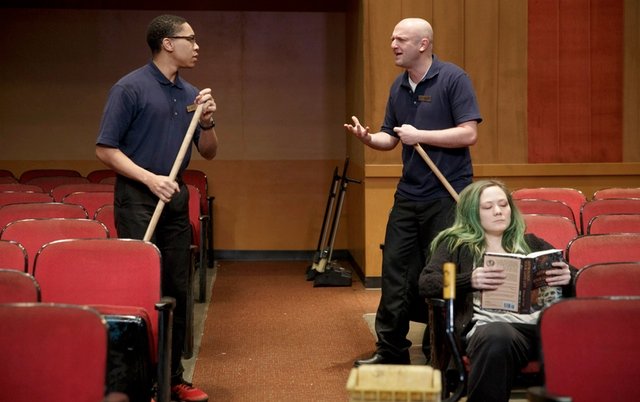Theater Review: <em>The Flick</em>
March 31, 2013, 5 p.m.
The Flick, Annie Baker's new play about the employees of a shabby New England movie theater, starts where the movies end.

They just work here.
The Flick, Annie Baker's new play about the employees of a shabby New England movie theater, starts where the movies end. David Zinn's hyper-realistic set design positions the audience where the screen would be, looking back out on 15 or so rows of red seats that have seen better days. First comes darkness; then, from the projection booth, a partially blinding flickering white light of an unknown movie and its anthemic score. For several minutes, the audience is the screen on which Hollywood's illusions are cast, and then the film reel sputters out and the dreary house lights lurch on. The theater is empty and silent until the stars of our show enter: the ushers.
Baker has a real knack for capturing the halting, self-conscious vernacular of cerebral yet underachieving twenty-something suburbanites. In plays such as Circle Mirror Transformation and The Aliens—which took place by a dumpster behind a New England coffeeshop—she's scorned flashy plot points and dramatic devices; Baker's approach to theater is akin to putting a stethoscope up to her characters' chests and inviting the audience to listen in. Their heartbeats can be wild and arrhythmic, but also unnervingly familiar.
The Flick centers on three employees of one of the last non-digital cinemas in Massachusetts. The first two we meet are Avery, a college kid who just got the job, and Sam, a lower-middle-management sad sack in his mid-thirties whom Baker writes "used to be very into Heavy Metal." The action, as it were, consists of Sam and Avery cleaning up the theater between screenings, with bursts of conversation tumbling awkwardly out of long silences. Much of this is amusing—for instance, Avery, a cinephile, has come to the conclusion he's "kind of over movies," and can't contain his outrage when Sam enthusiastically cites Avatar as proof that American cinema is alive and well.
Their banter is brought to life with pitch-perfect delivery from the always wonderful Matthew Maher, who plays the pent-up Sam, and Aaron Clifton Moten as the uncomfortably numb Avery. Sam's bitter that he's been repeatedly passed over for promotion to the coveted projectionist gig, which is where The Flick's anti-ingenue hovers. Rose, the projectionist, is played with blunt intensity by Louisa Krause, a hard-drinking young local whom Baker describes as "sexually magnetic, despite the fact that (or partly because?) her clothes are baggy, she never wears makeup and her hair is dyed forest-green." The booth is Sam's heaven, and Rose is his goddess.
Over the course of three hours, the three misfits blunder in and out of each other's isolated bubbles, making contact in any way they can to alleviate the oppressive drudgery of their tasks. The contours of an awkward love triangle are drawn and then awkwardly rubbed out, while any modicum of ambition is crushed—Avery's romantic mission to stop the theater from going digital is a fool's errand, while Sam's longing to ascend to the projection booth with Rose is the kind of Hollywood ending that would make Avery barf.
Baker's restraint is admirable, and when "something big" does "happen," it carries the kind of weight that probably won't translate if I simply describe the play's biggest plot point. The Flick exposes us to their unenviable chores in an unusually intimate way—most plays don't take such a sustained look at work, even ones that take place in the workplace. And maybe there's a reason for that—the dreary atmosphere that permeates life at The Flick is recreated with militant realism; it rolls out over the real-life audience like a fog that starts to feel a little oppressive. It could be that, as Wallace Shawn once put it, I've "always really been a lowbrow at heart," but after a while I started hoping the workers would finish up so I could watch a movie.
The Flick continues through April 7th at Playwrights Horizons. Tickets here.